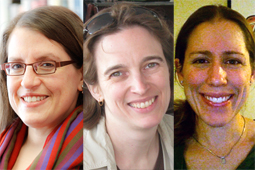Sociologists to research 'Who is a JewBu?'
Scholars will explore how religions mix and influence one another

From left, Assistant Professor Sara Shostak, Associate Professor Wendy Cadge and Ph.D. candidate Emily Sigalow
Who are the JewBus? What is a JewBu?
These and other, more sophisticated questions about the meeting of the distinctive cultures, traditions and practices of Judaism and Buddhism are being asked by two members of the Sociology faculty, Associate Professor Wendy Cadge and Assistant Professor Sara Shostak, in research they began this month with Emily Sigalow, a student in the joint Ph.D. program in Sociology and Near Eastern and Judaic Studies.
"Sara and I have been talking with each other and with Emily about Jewish-Buddhist intersections for long time," Cadge says. "We want to look at the history of Buddhist-Jewish relationships, asking questions about how Jews influenced the development of some early Buddhist groups in the United States and how, more recently, Buddhists have influenced some Jewish groups."
She says they also intend to investigate "what kind of religious identities are possible for Jewish practitioners of Buddhism and vice versa... We know there are a lot of JewBus out there but nobody knows much about their history and practices. We are trying to figure out who they are and what kinds of historic, religious and cultural factors led them to be who they are."
Shostak adds: "There are at least two different kinds of intersections - Jews who practice Buddhist meditation and see this as part of their Jewish practice, and people who were born Jewish who are now leading teachers of Buddhism in America. Each is associated with a different set of religious institutions. So, this is a really compelling opportunity to think about evolving religious identities and practices."
A broader reason for undertaking the study is to understand whether mixing and exchanges between Jews and Buddhists suggests ways for students and teachers of theology to understand and respond to increasingly permeable boundaries among religions generally.
"Examining the historical and contemporary relationship between Judaism and Buddhism," Sigalow says, "will help scholars better understand how religions develop and change in relation to one another."The research is funded by the E. Rhodes and Leona B. Carpenter Foundation, which, among other work, makes grants in support of graduate theological education.
The Brandeis scholars will work with consultants from Harvard Divinity School and Auburn Theological Seminary to develop materials for master's students in theology. These materials will be piloted at Auburn and Harvard. Cadge, Shostak, and Sigalow also will create a case study for the Pluralism Project at Harvard University, an effort to study religious diversity in America.
The research will focus on Buddhist and Jewish communities in western Massachusetts, New York and California.
Categories: Humanities and Social Sciences, Research






